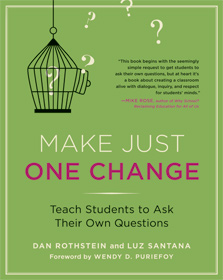written and compiled by Jane Santa Cruz
This issue of InQuiring Minds reaches back to explore that initial feeling of curiosity that can then spark all learning, creativity, and innovation. We should understand why curiosity is so valuable before we can begin to know how to keep our curiosity alive. The articles below capture the importance of curiosity along with discussing how the skill of asking questions can activate and sustain curiosity in learners of all ages.
Our first article, written by Sarah Boesveld, asks a crucial question: “Did the internet kill curiosity?”. We have so much instantaneous information available to us and yet, so much time is spent on superficial activities like checking Facebook, sending emails, and playing Candy Crush. It could be a major concern if people aren’t routinely leveraging the Internet for curiosity and access to knowledge. Boesveld cites Ian Leslie, the author of Curious: The Desire to Know and Why Your Future Depends on It, who shares that, “unless you’ve grown up acquiring these habits of learning … already in your head, then you find it very hard to absorb information from the Internet and you’re much more likely to use it as a shortcut … without … depth and detail.”
People of all ages need to practice asking questions and thinking critically so that these processes become habits and part of ongoing learning and workplace practices. When people follow new trajectories of inquiry, the Internet can be an essential conduit for finding answers and reaching deeper learning.
Another article asks, “Does GPS kill curiosity?”, and the authors, David Sturt and Todd Nordstrom, investigate geocaching, which essentially sends interested explorers off to investigate new areas and locate something hidden using GPS. The authors found that many people didn’t find any value whatsoever in geocaching, which seems like an oddly negative reaction to simple exploration. Their introductory geocaching example underscores their greater argument that we’re not prioritizing or cultivating that sense of curiosity, innovation, and exploration in our regular work. Sturt and Nordstrom showed “that companies know creativity is important, but they aren’t very good at being creative.” It’s critical to have curiosity stimulate companies to stay ahead of their competition and continue building on new ideas. Without curiosity, employees don’t learn anything new about their roles and practices and organizations cannot move forward.
Our next article touches on the important question of how, specifically “How Can Teachers Foster Curiosity?”. Erik Shonstrom writes, “For students to be curious, they must feel worthy of seeking. They must feel entitled to ask questions and encouraged to stray, to explore, to seek.” He points out that it is difficult for teachers to give students the time to explore in school with increased pressure (on both students and teachers) to demonstrate significant gains on standardized tests over brief periods of time. Nevertheless, Shonstrom stresses that schools must develop inquisitive learning environments and build student curiosity because that feeling is “the key to learning”.
Curiosity isn’t secluded to classrooms. Annie Murphy Paul at Time magazine discusses the importance of curiosity as “the engine for intellectual achievement” and offers suggestions for “How to Stimulate Curiosity”. In fact, her initial suggestion is “Start with questions” to stimulate curiosity: “being told an answer quells curiosity before it can even get going. Instead of starting with the answer, begin by posing for yourself and others a genuinely interesting question — one that opens an information gap.” Asking questions is a key activity for anyone in any field to create learning momentum.
Hal Gregersen goes one step further for making questioning a daily habit. While his article, “Don’t know what to ask? Secrets of Good Questioners”, is directed towards leaders in business, his advice for making questioning a regular routine is applicable to everyone. He asserts that by spending 4 minutes a day to ask questions around whatever challenge we’re facing, we can renew our sense of curiosity and be more creative. Moreover, Gregersen founded the 4-24 Project, “which strives to rekindle the practice of asking provocative questions and to inspire a new generation of innovators.” Everyone can ask questions and therefore, everyone has the ability to think critically and creatively.
In closing out this issue of InQuiring Minds, we are leaving our readers with a wonderful piece from Scientific American. The author, Ashutosh Jogalekar, recounts how Abraham Flexner began the Institute for Advanced Study (IAS) in Princeton through the generous donation of the Bamberger family. The Institute was created to be a place for curiosity, pursuing ideas, and imagining new possibilities. In fact, scientists were encouraged to simply pursue their interests and explore various topics without focusing on tangible outcomes. Jogalekar highlights Flexner’s 1939 Harper’s Bazaar article demonstrating his support and argument for exploration without focusing on outcomes, profits, or production. In advocating for “useless” curiosity, Flexner wrote, “[W]hat is infinitely more important is that we shall be striking the shackles off the human mind and setting it free for the adventures,” which in our own day have, on the one hand, taken Hale and Rutherford and Einstein and their peers millions upon millions of miles into the uttermost realms of space, and on the other, loosed the boundless energy imprisoned in the atom.”
Jogalekar writes that many scientists have reached astounding conclusions and developed new inventions just by following their interests and attempting to find answers to their questions. Certainly, they didn’t know that they would create these things when they started their inquiries; however, this experimental time to play with ideas and concepts ended up being fundamental to making future discoveries.
“Asking questions is the gateway towards curiosity and building an endless path for learning.”
These articles emphasize that while there is a noticeable lack of natural curiosity and exploration in our daily habits, our natural sense of curiosity is certainly not lost forever. We must find ways to bring exploration back and implement habits around continually asking questions. By starting with questions, we can spark new interests and increase personal growth; and by continuing to ask questions as a society, we can create organizational cultures that value curiosity without larger expectations and generate new ideas for 21st century needs.





Speak Your Mind